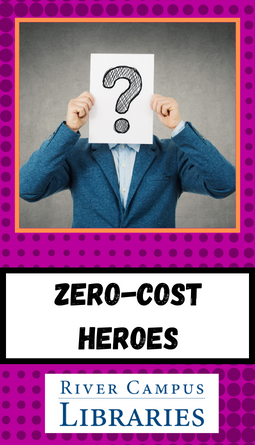
The Open Education Resources (OER) Working Group of the River Campus Libraries (RCL) is working toward its third year of an Open Education grant program and has identified more low-cost/increased-access champions across campus. This year, we close out Open Education Week/Month 2023 by proudly announcing 7 new Zero-Cost Heroes. This brings our total number to 28 over the past two years (see heroes of our first, second, and third rounds). Of the newly inducted heroes, we see a power trio of student, TA/instructor, and librarian and various ways in which faculty vocalize and exhibit their commitment to reducing student costs. It is noteworthy to mention that we had more student nominations for Zero-Cost Heroes this year than we have seen in the past.
All of our selected heroes are instructors and faculty (and this year students!) who, for a number of reasons, have chosen to select or create course materials that are free for their students. Each day we'll be highlighting one hero, sharing their motivations for championing free course materials, how they've worked with the library to make it happen, and what their students have to say about zero-cost materials.
Highlighting Zero-Cost Heroes is part of an ongoing RCL effort to ensure equity, access, and empowerment for all Rochester students. Other examples of this effort include the ACT commitment and much of what is found on the Open Education Services page, where you can view a number of presentations from our OER and Open Pedagogy workshop series.
Want to nominate someone as a Zero-Cost Hero? Email us at rclconsult@library.rochester.edu.
Monday’s Zero Cost Hero: Dr. Karen Berger
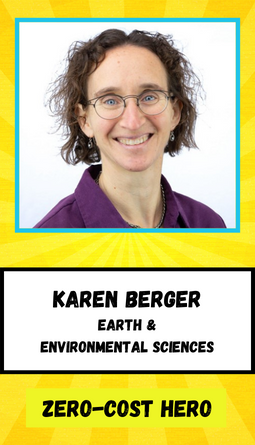
Karen Berger, an associate professor of instruction, has gone through a few different textbooks for her course “Intro to Environmental Science.” She’s moved away from traditional textbooks for two main reasons, the first of which is cost. For many students, a $120 textbook is a significant expense. The second reason is they age too quickly.
"It feels like as soon as something is published it's out of date," says Berger.
Pulling together course readings from a variety of sources is more work, but Berger feels it’s time well spent. She values knowing she has the right materials and the flexibility to update readings as they become out-of-date.
In the last two years, Berger started using Perusall, an online social annotation platform, as an incentive for students to complete readings. Because students can comment on readings and ask questions, she’s easily able to see which topics students found most engaging or confusing. “It's a feeder for conversation," she says. “It’s great to be able to say, ‘Here are a handful of questions you had, let’s talk about them.’”
But do students miss their traditional textbooks? Sometimes, but it’s rare. In fact, the way Berger provides readings is one of the reasons she was nominated to be a Zero-Cost Hero. A student in her Intro to Environmental Science course said they like the “accessible readings and lecture materials including built-in highlights.”
In a course that often includes non-science majors, having materials written for varying audiences makes it easier for students to engage. “Part of my goal is to get them to read about these things in the kinds of places they will read about them in the future,” says Berger.
What’s next for Zero Cost Hero Karen Berger? With a colleague at another institution, she’s been developing her own text for another course, modeled after an environmental problem-solving text called "Consider a spherical cow." Her version is for an introductory level; the working title: "Consider a spherical calf."
Tuesday’s Zero Cost Heroes: POA's Power Trio
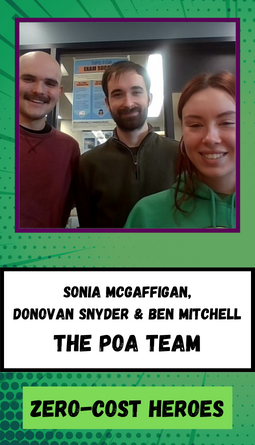
When it’s time for undergraduate students in the fields of physics, astronomy, optics, and math (POAM) to locate and purchase their required course textbooks, it is strongly advised that they first look to see what’s available in the Physics-Optics-Astronomy (POA) Library.
Sonia McGaffigan ʼ23 and Donovan Snyder, a second-year doctoral candidate and math teaching assistant (TA), are among the students working at the POA Q&i service desk who are looking out for their peers’ financial situations. They diligently identify the books students need and alert Ben Mitchell, the POAM librarian, enabling him to make timely purchases. Together, this zero-cost hero (ZCH) trio is helping to reduce students’ textbook costs.
McGaffigan and Snyder typically know what to look for and how to find it within the POA collection, but when can’t, they look to Mitchell, whose “super powers” keep even the trickiest books from hiding. And it’s all for the students.
“They are already spread thin with various school demands, basic living costs, mental health, food, etc.,” says McGaffigan, who would like to see course reading materials ultimately become part of the University’s educational package. “Learning shouldn’t be dependent on access to textbooks.”
Course materials on reserve also help keep costs down, but Snyder notes that the limited number of materials and time they can be checked out can be a hindrance for large classes. However, because POA is such a tight-knit community, many students know each other, making needed books easier to find—and usually a shout away.
Sharing course texts and collaborating to solve problems are part of POA’s strong community vibe. That’s why students like McGaffigan and Snyder feel free to send student needs to Mitchell with the hope he can make purchases.
“The POA community really cares about each other,” says Mitchell. “The students want everyone to have access to the required textbooks. They want everyone to succeed.”
Wednesday’s Zero Cost Hero: Dr. Stuart Jordan
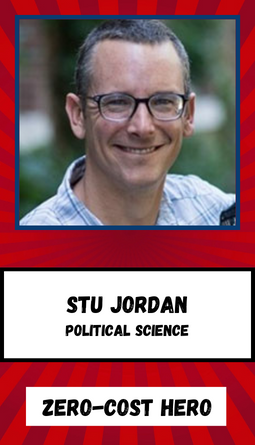
For years, Stuart Jordan, an associate professor of political science, has been experimenting with the intersections between open pedagogy and open assignment design, experiential learning, and digital literacy in his classes. Using open education resources (OER), he was able to combine many of these concepts in Learning Positive Political Theory, a new textbook for his course PSCI 107: Intro to Positive Political Theory.
The new OER-based textbook, hosted on River Campus Libraries’ Digital Scholar, was built using Quarto and Observable. It includes multimodal and interactive components and data visualizations, along with supplementary exams. Jordan went this route because he wanted a textbook that integrates the way political science theory is used in conjunction with mathematical models and data analysis—traditional texts can't do that.
"Printed textbooks are just books,” says Jordan. “But web browsers are dynamic, so we can move quickly from model to what the data says, and the homework assignments are included right within the text at the point where applicable concepts are explained.”
Jordan began creating the text while teaching the course last fall semester, taking note of what was working and what could be improved. He’s currently working on making adjustments and considering making the source code available in GitHub.
Jordan’s students have offered plenty of positive feedback, especially for the unit on game theory, which included helpful videos on solving mathematical problems.
Best of all, the new text replaces a commercially produced textbook, creating a savings of $28 per student. That might not seem like a significant cost reduction, but according to the Education Data Initiative, the "average postsecondary student spends between $628 and $1,471 annually for books and supplies." When spending that much money, every dollar saved helps.
Thursday's Zero Cost Hero: Dr. Tanya Bakhmetyeva
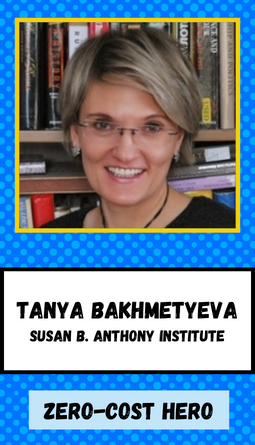
When it comes to the cost of books, Tanya Bakhmetyeva, an associate professor of gender, sexuality, and women’s studies, can relate to her students better than most. As an immigrant to the United States, a first-generation college student, and a mother to college students, she has been on all sides of the course reading list.
In her first days of graduate school, Bakhmetyeva remembers getting lists of hundreds of dollars of books with no idea how she was going to afford it. And she saw the worry in the faces of her daughters when they had to ask for money for their books.
Now, Bakhmetyeva is the one handing out the lists. Knowing the anxiety these lists can create, it’s especially satisfying to hear the sighs of relief when she tells the class the cost of their reading is $0.
“This is hard on parents and families, and the faculty can help with this,” says Bakhmetyeva. “If I can have the same conversations [in class] with different materials, I’ll do it. But if not, I’ll bring it up with students, because their voice matters.”
All of Bakhmetyeva’s readings are in Blackboard and all books are available as ebooks or on course reserve at the library. These free and readily available readings are precisely why she was nominated to be a Zero-Cost Hero by her student Sarah Woodams ’24.
The recognition is well-deserved because the no-cost reading list does have a cost: Bakhmetyeva’s time. She works hard—with the help of social sciences librarian Justina Elmore and the Course Reserves team—to make a reading list with little to no cost that meets the learning goals of the class. But she sees it as one of her responsibilities as a professor.
“It’s respectful and acknowledges their struggle,” Bakhmetyeva says. “And it is absolutely worth my time. You have to respect the students’ time and treat them the way you’d want to be treated. This is my expression of respect for them.”
Friday's Zero Cost Hero: Dr. Kevin Clarke
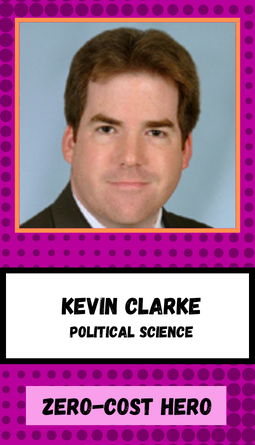
Kevin Clarke, an associate professor of political science, was nominated as one of this year’s zero-cost heroes by a student who has taken two of his courses in recent semesters. "Kevin has always hyperlinked his syllabi with downloadable PDFs for all the required reading material for the class,” said the student.
Clarke uses free materials in all the courses he teaches, ensuring equity, access, and empowerment for all of his students. “I moved away from textbooks a few years ago due to the expense,” he says. “It just got to be too much for students.”
Instead of traditional textbooks, Clarke uses a combination of open access resources and articles available to students through the library as course readings for both graduate and undergraduate courses.
“Stats books run around $100 to $120 for undergrads,” says Clark, “so I use the open access book ‘OpenIntro Statistics’ instead.”
OpenIntro is a publishing platform with the mission to make educational products such as textbooks, educational videos, and other multimedia materials free, transparent, and lower barriers to education. To learn more about open access and discover more open textbook repositories, visit River Campus Libraries' Open Education website.

